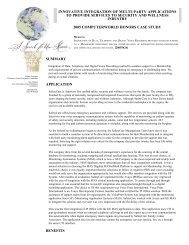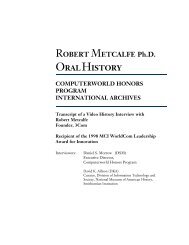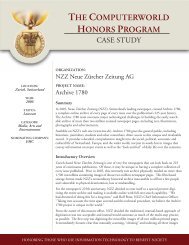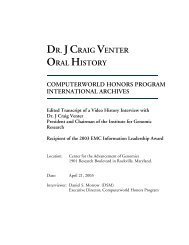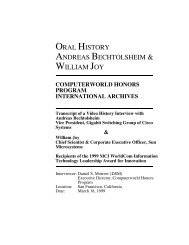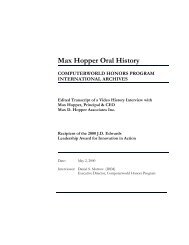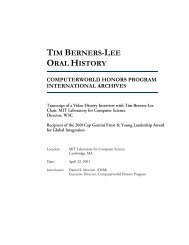NATHAN MYHRVOLD PhD ORAL HISTORY - The Computerworld ...
NATHAN MYHRVOLD PhD ORAL HISTORY - The Computerworld ...
NATHAN MYHRVOLD PhD ORAL HISTORY - The Computerworld ...
You also want an ePaper? Increase the reach of your titles
YUMPU automatically turns print PDFs into web optimized ePapers that Google loves.
DA: That’s something that you may worry about.<br />
NM: Well there are a lot of concerns that one can have I think. <strong>The</strong>re are some<br />
huge societal concerns. Our country was based on a set of bets on human nature<br />
encompassed in the Bill of Rights and the Declaration of Independence. Those were<br />
radical bets at that time. <strong>The</strong> notion is that you should have freedom of speech, that<br />
you shouldn’t be enforced to incriminate one’s self. It was better to have a legal<br />
system that let some guilty people go free to avoid prosecuting the innocent. In the<br />
latter part of the 18th century, the late 1700s when our country made those bets,<br />
they were radical bets, which I think have been hugely successful. I think every<br />
American would say they’re hugely successful. But cyberspace is taking all of those<br />
same issues and they’re bringing it back up to us, and they’re bringing it back up in a<br />
new twist. It’s just different enough that people don’t recognize it as the same bet.<br />
So very well meaning people say, “Well my god, we’ve got to censor the Internet.<br />
We’ve got to protect our children. We just can’t let anyone do this.” Yet if you<br />
think about it, it’s the same bet on human nature. So I’m very afraid that in this<br />
country, or in other countries around the world, very well meaning people will shy<br />
away from renewing those bets. In many cases the stakes are very high because the<br />
Internet represents the precursors for society that is far more open. We think we<br />
live in an open society, and we do by analog standards. In practices freedom of<br />
speech, not every individual is exposed to everything every other individual wants to<br />
say, but in the Internet you certainly can. In principle there are rights that we have<br />
as individuals. In practice, at a certain point they can knock down your door and<br />
haul you off to court, and a variety of other things can happen. In cyberspace that<br />
may not be so. <strong>The</strong>re are encryption techniques that are so powerful that so far as<br />
we know, millions of years of computers wouldn’t be enough to break them. So in<br />
fact you can have more privacy in the digital world than you ever had, practically<br />
speaking. Privacy is an important privilege in American society, but online you end<br />
up getting more of it. So I think the biggest concern is whether our society or the<br />
global society steps up to the plate again and makes those same bets on human<br />
nature. Or whether in a well meaning but misguided way, we shy away from that<br />
and create a less than open society in cyberspace, which ultimately would not just<br />
affect personal freedoms or policies or politics, ultimately I think it will affect how<br />
well this whole mechanism works, and whether we can have the digital renaissance<br />
that this promises to have for our species.<br />
DA: What a pleasure, just a genuine pleasure. Thank you.<br />
Nathan Myhrvold<br />
Oral History<br />
46



